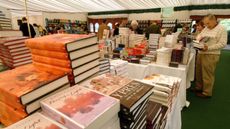Books for your must-read bucket list
A look at some of the best books ever written

Dracula by Bram Stoker (1897)
Bram Stoker’s gothic novel defined the modern vampire. “Dracula is THE vampire and the novel is THE vampire novel,” said The Guardian.
Told through diary entries, letters and newspaper clippings, Dracula follows Jonathan Harker and his fiance Mina as they try to stop the bloodthirsty Count Dracula.
The Kite Runner by Khaled Hosseini (2004)
In a 2014 interview with The New York Times activist Malala Yousafzai said “all students should read The Kite Runner”. A coming of age story set against the backdrop of Afghanistan’s last peaceful days before the Russian invasion, it shows the country “as a place not only of war, but of honour, innocence and beauty”. Yet, despite its setting, “the human aspects of the story transcend time and place”.
Subscribe to The Week
Escape your echo chamber. Get the facts behind the news, plus analysis from multiple perspectives.

Sign up for The Week's Free Newsletters
From our morning news briefing to a weekly Good News Newsletter, get the best of The Week delivered directly to your inbox.
From our morning news briefing to a weekly Good News Newsletter, get the best of The Week delivered directly to your inbox.
She Said by Jodi Kantor and Megan Twohey (2019)
Jodi Kantor and Megan Twohey are The New York Times journalists who bought down Harvey Weinstein and ignited the #MeToo movement in 2017. In She Said the duo recount the “inspiring and affecting journeys of the women who spoke up”, said GoodReads. The book also reveals “shocking new information from hidden sources” as Kantor and Twohey discuss the consequences of their investigation.
White Teeth by Zadie Smith (2000)
Zadie Smith’s debut novel follows the lives of wartime friends Samad Iqbal and Archie Jones, and their families in London. Its twists and multiple layers make it “energetic, pacey and funny”, said The Times. White Teeth reflects the “modern melting pot that is the country today”.
Animal Farm by George Orwell (1945)
George Orwell’s 1945 classic is “one of the most telling satiric fables ever penned”, said GoodReads. Overworked animals rise up against their master to strive towards a progressive utopia, where justice and equality prevail. Though Orwell aimed this “razor-edged fairy tale” at Stalinist Russia, whenever and wherever freedom is attacked, Animal Farm’s message remains “ferociously fresh”.
I’d Die For You: And Other Lost Stories by F. Scott Fitzgerald (2017)
When he died, F. Scott Fitzgerald left behind a stack of unpublished stories that have remained unread for almost 80 years. The Great Gatsby author had every intention of seeing them printed, but some of the works touched on subject matters just too controversial for his day. “Rather than permit changes and sanitising by his contemporary editors, Fitzgerald preferred to let his work remain unpublished,” said his US publisher, Scribner. The last remaining stories, sourced from libraries and private collections, including those of Fitzgerald’s family, have been compiled into a collection edited by Anne Margaret Daniel. While the title tale, I’d Die For You, is drawn from Fitzgerald’s time in North Carolina, when his and his wife Zelda's health was falling apart, the stories span his career from 1920 to the time of his death in 1940.
A Room of One’s Own by Virginia Woolf (1929)
“A woman must have money and a room of her own if she is to write fiction,” Woolfe wrote in this key work of feminist literary criticism. Through the fictionalised character of Mary, Woolf argues that both literature and history is a male construct, built to marginalise women. She explores the ideas of the erasure and silence of women throughout time, and how poverty and sexual constraint affects female creativity. In writing this, she rejects the notion that women are inferior writers and instead proves the existence of a space for women in both literature and history.
The Promise by Damon Galgut (2021)
“One of the world’s great writers,” trumpets Edmund White on the cover of the South African author Damon Galgut’s novel. This is “no exaggeration”, said John Self in The Times: Galgut has already written several remarkable novels – including The Good Doctor (2003) and In a Strange Room (2010) – and his latest may be his best of all. The Promise won the 2021 Booker Prize.
Killing Commendatore by Haruki Murakami (2018)
The celebrated Japanese author returned to the spotlight in 2018 with the English translation of his novel; the story of a failing portrait painter whose life begins to change after a he discovers a mysterious painting referencing Mozart’s 18th-century opera Don Giovanni. “As is often the case in Murakami’s fiction, a plot of relative simplicity – an artist’s reinvention – is disrupted by enigmatic, surreal or violent incidents” said Charles Finch in The Independent.
The Sellout by Paul Beatty (2016)
Paul Beatty’s 2016 Booker Prize-winning novel is “outrageous, hilarious and profound”, said Simon Schama in the Financial Times. A biting satire about a young man’s isolated upbringing and the race trial that sends him to the Supreme Court, The Sellout showcases a comic genius at the top of his game. This is the “most badass first 100 pages of an American novel I’ve read”, said Dwight Garner in The New York Times.
Speak No Evil by Uzodinma Iweala (2018)
The second novel from the author of Beasts of No Nation (adapted into an award-winning Netflix film), Speak No Evil covers strikingly different ground to its predecessor. Harvard-educated Iweala starts his follow-up novel far closer to home with a Harvard-bound hero from a well-off Nigerian family. But after young Niru is inadvertently outed to his profoundly homophobic parents by his white friend Meredith, the novel “veers into the dark unknown” as his life becomes “a journey of confusion, torment and, eventually, violence”, Vulture said.
No One is Talking About This by Patricia Lockwood (2021)
Another title on The Booker Prize 2021 shortlist was Patricia Lockwood’s No One is Talking About This. Lockwood is a young American poet and memoirist whose elegantly witty tweets – “@ParisReview So is Paris any good or not” – have earned her the moniker “poet laureate of Twitter”, said Johanna Thomas-Corr in the New Statesman. Now she has produced the “best novel I have read about the internet”.
The Passenger by Ulrich Alexander Boschwitz (1939)
This “dramatic thriller” - first published in 1939 and recently rediscovered – tells the story of a Jewish businessman on the run inside pre-war Germany, said The Times. Trying to flee the Nazis, he crisscrosses Germany by train - but realises that all exits are closed. “Stunning,” said Alec Russell in the FT - “easily” my book of the year.
Klara and the Sun by Kazuo Ishiguro (2021)
Kazuo Ishiguro’s first novel since winning the 2017 Nobel Prize for Literature is “set in an uneasy near-future, in which AI and genetic enhancement threaten to create a human underclass”, said The Guardian. It tells the story of a robot who becomes an “artificial friend” to a sickly teenager. Klara and the Sun is a “slow-burn masterpiece”, said the FT - a brilliant examination of what it means to be human.
Milkman by Anna Burns (2018)
Anna Burns’ 2018 Booker Prize-winning novel about the Northern Irish Troubles was the unanimous choice of the judges and has been widely hailed as a darkly comic masterpiece. Told from the perspective of a 18 year-old girl with no interest in the conflict, Milkman is “viciously funny. Its jokes come out askew, as does its plot”, said The Daily Telegraph. Burns, who was shortlisted for the Orange prize in 2002 with No Bones, which also depicted the Troubles, “is excellent at evoking the strange ecosystem that emerges during protracted conflict”, agrees The Guardian. The New Statesman said that “while Milkman is a work of timely universality, it is also a distinctly Irish novel, a darkly mirthful satire with a twist of Beckettian melancholy and an anarchic touch of Swift”.
Lincoln in the Bardo by George Saunders (2017)
George Saunders' first novel made him just the second American to win Britain's highest literary award, the Man Booker Prize. The novel is set immediately after the death of Abraham Lincoln's 11-year-old son Willie during the US civil war. Historical fact mixes with supernatural elements as Willie's death raises an array of talkative ghosts, 166 to be exact, from the “bardo”, a Tibetan version of the afterlife. Saunders's enlivening imagination runs wild in detailing the ghosts' bizarre manifestations, but melancholy is the novel's dominant tone”, says Publishers Weekly.
I Feel Bad About My Neck by Nora Ephron (2006)
“With her disarming, intimate, completely accessible voice, and dry sense of humour, Nora Ephron shares with us her ups and downs in I Feel Bad About My Neck”, says GoodReads, which calls the book a “candid, hilarious look at women who are getting older and dealing with the tribulations of maintenance, menopause, empty nests, and life itself”. Ephron speaks frankly and uproariously about life as a woman of a certain age. Courageous, wickedly funny and unexpectedly moving in its truth-telling, this is a book of wisdom, advice and laugh-out-loud moments.
Educated by Tara Westover (2018)
Tara Westover, who grew up in a Mormon commune in Idaho, didn’t see the inside of a classroom until she was seventeen, but it was an experience that dramatically changed the trajectory of her life. Voted the number one book of the year by Amazon book editors, who called it their “hands-down favourite”, Westover’s “stirring memoir chronicles how she survived her survivalist upbringing, eventually earning a PhD from Cambridge University” and is “a rousing reminder that knowledge is, indeed, power” says Business Insider.
The Finkler Question by Howard Jacobson (2010)
In 2010, the Man Booker Prize for fiction went to the English novelist Howard Jacobson for The Finkler Question, a humorous exploration of Jewishness and the first time in the prize’s history that it went to an out-and-out comic novel. “Full of wit, warmth, intelligence, human feeling and understanding”, this novel is “also beautifully written with that sophisticated and near invisible skill of the authentic writer” says The Guardian.
The Diary Of a Young Girl by Anne Frank (1947)
When Otto Frank was liberated from the Auschwitz Nazi death camp in January 1945, he found he was the only member of his family left alive – but the diary his daughter Anne had kept during the two years they spent hiding in an Amsterdam attic had survived. He was persuaded to have the diary translated into English and published. Today, it is perhaps the best-read book about the Second World War and is particularly accessible to teenagers, with Anne’s chatty confidences about boys and her family. “Her book is not a classic to be left on the library shelf”, says The New York Times, “it is a warm and stirring confession, to be read over and over for insight and enjoyment”.
Beloved by Toni Morrison (1987)
Beloved is “one of the few American novels that take every natural element of the novel form and exploit it thoroughly, but in balance with all the other elements”, says novelist Jane Smiley in The Guardian. The result is that it is “likely to mould or change a reader’s sense of the world”. Set in the mid-1800s in the aftermath of the American Civil War, Beloved follows the story of Sethe who is haunted by the violent trauma she endured when enslaved at Sweet Home, Kentucky.
Revival by Stephen King (2014)
Revival is one of the most critically acclaimed works by bestselling crime and horror writer Stephen King. The 2014 novel begins with the arrival of a new Methodist minister in early 1960s Maine. “The sheer strangeness of the story, along with King’s ability to pull you along through his sprawling literary canvas, makes Revival one of King’s most enjoyable reads”, says Vox.
Wolf Hall by Hilary Mantel (2009)
Wolf Hall, the first novel in Hilary Mantel’s historical trilogy, tells the story of Thomas Cromwell’s rise to power in the court of Henry VIII and has been adapted into both a BBC miniseries and a Royal Shakespeare Company stage production. “Thomas Cromwell remains a controversial and mysterious figure,” says The New York Times’ 2009 review. “Mantel has filled in the blanks plausibly, brilliantly”, and “its 500-plus pages turn quickly, winged and falconlike”.
The Secret History by Donna Tartt (1992)
Pulitzer Prize-winning author Donna Tartt’s The Secret History is an indisputable modern classic. The gripping reverse-murder mystery follows a group of New England college students who discover a way of thinking and living that is a world away from the humdrum existence of their contemporaries. “Whether you decide it’s a brilliant exposé of the innate darkness of human nature or simply the implausible tale of indulged rich kids who like a bit of sexual deviancy is up to you,” says The Sunday Times. “Either way, it’s a page-turner that will keep you guessing until the end.”
Girl, Woman, Other by Bernardine Evaristo (2019)
Experimental writer and Londoner Bernardine Evaristo shared the 2019 Booker Prize, becoming the first black woman to win. Girl, Woman, Other features 12 characters and is written in a blend of poetry and prose. “If you want to understand modern day Britain, this is the writer to read,” says the New Statesman, calling the book “a story for our times”.
The Handmaid's Tale by Margaret Atwood (1985)
In a totalitarian future, women's rights are suddenly and severely restricted – those who are incapable of integrating with the ideals of the new regime are banished to “the Colonies to clean radioactive waste, while fertile young women are kept as "handmaids", forced to bear children for elite couples. “Often labelled a feminist dystopia, the novel captivates and terrifies in equal measure”, says The Guardian.
Shuggie Bain by Douglas Stuart (2020)
The 2020 Boozer Prize winner is a tale of poverty, addiction and abuse set in and around Glasgow in the 1980s. Shuggie Bain’s mother is an alcoholic; his father, a violent, fitfully present taxi driver. As family members drift away, he becomes his mother’s sole carer – and it is their relationship that forms the novel’s emotional core. Shuggie Bain "does what all good fiction should and makes you walk in the scuffed trainers of people who live very different lives,” says Robbie Millen in The Times.
The Road by Cormac McCarthy (2006)
Cormac McCarthy's bleak saga sees a father and his young son traverse post-apocalyptic America, the land torched and barren from an unnamed catastrophe, with nothing but a small stockpile of supplies and a pistol at their disposal. Cannibal gangs, sickness and lack of food threaten their survival as they head south towards the coast, where they hope to flee the coming winter. “The Road would be pure misery if not for its stunning, savage beauty,” says Janet Maslin in the New York Times.
The House of Mirth by Edith Wharton (1905)
Edith Wharton’s second novel is “a masterpiece that remains electrifying and relevant in our 21st century,” says The Guardian. The tragic, ahead-of-its-time tale - thought to be one inspiration for the hit TV show Gossip Girl - follows forward-thinking heroine Lily Bart as she moves through New York high society. “Edith Wharton guides us through genial banter, cutting sarcasm, pouting prettiness, devastating beauty, comedy and tragedy and we follow her trail,” writes Alyson Rudd in The Times.
One Hundred Years of Solitude by Gabriel García Márquez (1967)
This landmark novel by Colombia’s most beloved author, Gabriel García Márquez, is a postmodern masterpiece. Telling the story of seven generations of the Buendía family and of Macondo, the town they built, it should be “required reading for the entire human race”, The New York Times said. According to Literary Hub “there are hits, and then there are smash hits, and then there are rocket ships to Mars - One Hundred Years of Solitude would qualify as the last”.
In Cold Blood by Truman Capote (1965)
Truman Capote’s non-fiction novel reconstructs the murder in 1959 of a Kansas farmer, his wife and both their children. Subtitled A True Account of a Multiple Murder and Its Consequences, it actually began as a New York Times murder story that became transformed into a tale of “spine-tingling suspense and extraordinary intuition”, says The Guardian.
Moby Dick by Herman Melville (1851)
Herman Melville’s Moby Dick, or The Whale, was first published in October 1851. Though it was “not an immediate hit, and Melville didn’t live to see the fame his book would achieve”, it would eventually become one of “American literature’s most famous and beloved works of genius”, says Time.
The Pilgrim’s Progress by John Bunyan (1678)
Fully titled The Pilgrim’s Progress from This World to That Which is to Come is a Christian allegory - a story in which people, places and events represent abstract concepts, the British Library explains. Regarded as one of the most significant works of religious fiction in English literature, it has been claimed as one of the ten most published books of all time.
The Adventures of Huckleberry Finn by Mark Twain (1884)
Mark Twain’s story of a boy’s journey down the Mississippi on a raft conveyed the voice and experience of the American frontier as no other work had done before. A witty, satirical tale of childhood rebellion, it remains a “defining classic of American literature”, says Robert McCrum in The Guardian.
The Remains of the Day by Kazuo Ishiguro (1989)
Kazuo Ishiguro’s third novel won the Man Booker Prize for Fiction in 1989. A contemporary classic, The Remains of the Day is a beautiful and haunting evocation of life between the wars in a Great English House, of lost causes and lost love. It was ranked as one of the 25 greatest British novels in a BBC Culture poll.
Don Quixote by Miguel de Cervantes (1605 and 1615)
Published in two volumes in 1605 and 1615 by Spanish writer Miguel de Cervantes, Don Quixote - the first modern novel - “remains the finest”, says The Guardian’s Harold Bloom. It’s widely regarded to be the best literary work ever written and Bloom argues that “only Shakespeare comes close to Cervantes’ genius”.
The Great Gatsby by F. Scott Fitzgerald (1925)
Told from the perspective of Nick Carraway, who is befriended by eccentric neighbour Jay Gatsby, F. Scott Fitzgerald’s classic provides an “insider’s look into the Jazz Age of the 1920s in United States history, while at the same time critiquing the idea of the American Dream”, says Britannica. Fitzgerald’s masterpiece has become a “tantalising metaphor for the eternal mystery of art”, says The Guardian’s Robert McCrum.
To Kill a Mockingbird by Harper Lee (1960)
With more than 18 million copies in print and translated into 40 languages, Harper Lee’s classic novel set in America’s racist south won her the Pulitzer Prize in 1961 and is today regarded as a “masterpiece of American literature”, says GoodReads. Through the young eyes of Scout and Jem Finch, Lee explores with exuberant humour the irrationality of adult attitudes to race and class in the Deep South of the 1930s. The conscience of a town steeped in prejudice, violence and hypocrisy is pricked by the stamina of one man’s struggle for justice.
Charlie and the Chocolate Factory by Roald Dahl (1964)
Grab your golden tickets and head to Willy Wonka’s chocolate factory for a grand tour. Described as a “startling work of fantasy” by the Independent, Dahl’s classic features Charlie Bucket as the hero and he is joined at the chocolate factory by some nasty little beasts called Augustus Gloop, Veruca Salt, Violet Beauregarde and Mike Teavee.
The Tale of Genji by Murasaki Shikibu (1012)
Written by the noblewoman and lady-in-waiting Murasaki Shikibu during the early 11th century, The Tale of Genji is often referred to as the first novel, although it wasn’t translated into English until the 19th century. Despite its age, the book remains a remarkable and insightful read, telling the story of Prince Genji, the son of an emperor, whose love affairs and shifting political fortunes offer a glimpse of the golden age of Japan. The Washington Post calls it a “world-class masterpiece of fiction” that “rivals the classic novels of the West in artfulness and psychological depth”.
The Plot Against America by Philip Roth (2004)
Ambitious and unusual, The Plot Against America tells an alternate version of 20th-century history in which aviator and anti-Semite Charles Lindbergh wins the Republican nomination for US president for the 1940 election and defeats Franklin Roosevelt. The fictionalised history is told from the perspective of Philip Roth as a child, depicting Lindbergh’s landslide victory and an ensuing treaty with Hitler in which Lindbergh promises that the US won’t interfere in the Second World War.
Emma by Jane Austen (1815)
When it comes to Austen, it is a “near-impossible choice” between Emma and her seminal novel Pride and Prejudice, says The Observer’s Robert McCrum. But he chooses Emma, saying it “never fails to fascinate and annoy”. The protagonist Emma Woodhouse, from the fictional village of Highbury, plays matchmaker and meddles in the lives of her fellow inhabitants to devastating effect.
Wuthering Heights by Emily Bronte (1847)
First published under the pseudonym Ellis Bell, Wuthering Heights was the only novel written by Emily Bronte, the second-youngest of the Bronte siblings, and she died a year after its publication at the age of 30. “The scope and drift of its imagination, its passionate exploration of a fatal yet regenerative love affair, and its brilliant manipulation of time and space put it in a league of its own,” writes McCrum in The Observer. “This is great English literature, the fruit of a quite extraordinary childhood.”
Great Expectations by Charles Dickens (1861)
Great Expectations is a sprawling epic that tells the coming-of-age tale of the orphan Pip, with a few biting social critiques along the way. The jilted Miss Havisham, with her faded wedding dress and decaying cake, is also among the writer’s most intriguing characters. “Dickens achieved perfection with this gothic masterpiece,” says The Independent.
Middlemarch by George Eliot (1871)
Middlemarch is quintessentially British, taking the number one spot in BBC Culture’s greatest British novels poll in 2015. A book of sweeping historical importance, it details some of the more significant geopolitical events of the early 19th century, including the 1832 Reform Act, the beginnings of the railways and the death of King George IV. “Anti-romantic, yet intensely passionate, it is one of the greatest novels of all,” says Booker Prize winner A.S. Byatt in The Guardian.
Anna Karenina by Leo Tolstoy (1878)
Leo Tolstoy’s idea for this tale of a doomed adulteress's affair with a rich count reportedly grew from a daydream of “a bare exquisite aristocratic elbow”, says The Daily Telegraph. The result was what Nobel Prize laureate William Faulkner believed was the finest novel ever written. The book tells the story of the “sensuous and rebellious” titular character in her affair with the dashing officer Count Vronsky, before tragedy unfolds as Anna rejects her passionless marriage and must endure the hypocrisies of society.
My Antonia by Willa Cather (1918)
My Antonia is the final book in Willa Cather's “prairie trilogy” of novels - along with O Pioneers! and The Song of the Lark - lyrical, sweeping epics of the prairie, whose vivid evocation of the untamed Midwest and the pioneers who made it their home can stir up a powerful sense of nostalgia even in a reader who has never set foot in the US. “A writer of great skill, Cather produced a lush, romantic work that is a superb read,” says the Los Angeles Review of Books.
Ulysses by James Joyce (1922)
One of the most important modernist novels of all time, James Joyce’s bizarre, dense magnum opus Ulysses has been described by The Atlantic as “a deeply humanistic novel which is bursting with the enormous variety of life”. The story, characterised by a stream of consciousness narrative that changes focus wildly, concerns the meeting of two Irishmen, Leopold Bloom and Stephen Dedalus, in 1904 Dublin.
The Grapes of Wrath by John Steinbeck (1939)
The storms of the Great Depression - and the subsequent Dust Bowl - had barely settled when Steinbeck penned The Grapes of Wrath, an astonishing work of realist American writing. The book follows a family of impoverished “Okies” as they head out west in hope of a better life but, as Time says, they “find only bitterness, squalor and oppression as migrant agricultural workers living in Hoovervilles”. The magazine says it is “both a record of its time and a permanent monument to human perseverance”.
The Stranger by Albert Camus (1942)
A list of 100 Books of the 20th Century compiled by French publication Le Monde places Albert Camus’s existential, absurdist debut novel L’Étranger (The Stranger) at the top. Through the story of an ordinary man “unwittingly drawn into a senseless murder on an Algerian beach”, Camus used his seminal 1942 novel to explore what he termed “the nakedness of man faced with the absurd”, says GoodReads.
Lolita by Vladimir Nabokov (1955)
Nabokov’s extraordinary - and controversial - novel Lolita is a work of such poetic agility that it makes perhaps the most taboo subject tackled by 20th-century literature seem almost normal. In it, poet Humbert Humbert becomes obsessed with 12-year-old Dolores Haze and seeks to possess her by becoming her stepfather. “Published in 1955, it is many things: a love story; by its own admission a disturbing tale of child abuse; an elaborate game of language, rhythm and subtext, and much more,” The Independent says.
Things Fall Apart by Chinua Achebe (1958)
“The theme of preserving cultural history in the face of Western domination in this novel gave voice to the oppressed people in Africa and caught the attention of the world,” says the Open Education Database, of Things Fall Apart, written by Nigerian novelist Chinua Achebe. This classic novel is still widely read and studied as a searing and poetic critique of the damaging colonialist attitudes that permeates geopolitics.
The God of Small Things by Arundhati Roy (1997)
Set in 1969 in the southern Indian state of Kerala, Arundhati Roy’s debut novel The God of Small Things starts with a harrowing scene: memories of a family grieving around a drowned child's coffin. This story of family in the Indian caste system won the Man Booker Prize upon its release, and was described by The New York Times as “so extraordinary - at once so morally strenuous and so imaginatively supple - that the reader remains enthralled all the way through to its agonising finish”.
The Corrections by Jonathan Franzen (2001)
In 2009, literature site The Millions polled a panel of writers, editors and critics to determine the best book of the 21st century. The Corrections, Jonathan Franzen’s satirical family drama based in the Midwestern United States, was the winner “by a landslide”. “At its centre is the Lambert family, dominated by Alfred, the difficult patriarch, and Enid, the yearning and frustrated matriarch,” The Guardian said in a review at the time. “Three grown-up children, Gary, Chip and Denise, labour to live adult lives under the long shadow cast by their unhappy parents.”
Half of a Yellow Sun by Chimamanda Ngozi Adichie (2006)
“Are we ready for a novel about an imploding nation riven by religious strife and bloody wrangling over who controls the military, the civil service, the oil; a novel about looting, roadside bombs, killings and reprisal killings, set against a backdrop of meddling foreign powers?” The New York Times asked upon the release of Half of a Yellow Sun in 2006. The book tells the story of the Biafran War (or Nigerian Civil War) and its impact on civilian life through the eyes of Odenigbo, a radical university professor, his young girlfriend Olanna and a shy English writer Richard. The Seattle Times calls the book “a sweeping story that provides both a harrowing history lesson and an engagingly human narrative”.
Create an account with the same email registered to your subscription to unlock access.
Sign up for Today's Best Articles in your inbox
A free daily email with the biggest news stories of the day – and the best features from TheWeek.com
-
Why is Tesla stumbling?
In the Spotlight More competition, confusion about the future and a giant pay package for Elon Musk
By Joel Mathis, The Week US Published
-
 How Taylor Swift changed copyright negotiations in music
How Taylor Swift changed copyright negotiations in musicunder the radar The success of Taylor's Version rerecordings has put new pressure on record labels
By Theara Coleman, The Week US Published
-
 Job scams are increasingly common. Here's what to look out for.
Job scams are increasingly common. Here's what to look out for.The Explainer You should never pay for an application or give out your personal info before being hired
By Becca Stanek, The Week US Published
-
 Best UK literary festivals and book fairs in 2023
Best UK literary festivals and book fairs in 2023feature A look at some the biggest events for book lovers in Britain in 2023
By The Week Staff Published
-
 Fabulous foodie adventures in Peru, Japan and Australia
Fabulous foodie adventures in Peru, Japan and Australiafeature Featuring a Peruvian pilgrimage and foraging in the Volcanic Lakes and Plains
By The Week Staff Published
-
 Top 10 best debut novels of all time
Top 10 best debut novels of all timefeature Harry Potter and the Philosopher’s Stone took top spot in a poll of British literary lovers
By The Week Staff Published
-
 Watership Down: disturbing children’s film finally loses its U rating
Watership Down: disturbing children’s film finally loses its U ratingfeature The 1978 adaptation of Richard Adams’s novel no longer feels ‘suitable for all’
By The Week Staff Published
-
 How to pack efficiently and save on airfares
How to pack efficiently and save on airfaresfeature Travel tips and hacks for making the most of a bargain flight
By Alexandra Zagalsky Published
-
 Edge of Ember: affordable fine jewellery for classicists
Edge of Ember: affordable fine jewellery for classicistsfeature London-based brand has gone from strength to strength with its youthful and elegant designs
By Alexandra Zagalsky Published
-
 ‘Pinnacle of gastronomy’: how Central became the world’s best restaurant in 2023
‘Pinnacle of gastronomy’: how Central became the world’s best restaurant in 2023feature Flagship Lima restaurant of chefs Virgilio Martínez and Pía León is an ‘ode to Peru’
By Mike Starling Published
-
 Wandering star: Audemars Piguet’s new Code 11.59 Starwheel watch
Wandering star: Audemars Piguet’s new Code 11.59 Starwheel watchfeature Engmatic and alluring, this timepiece has a suitably spiritual backstory
By Alexandra Zagalsky Published